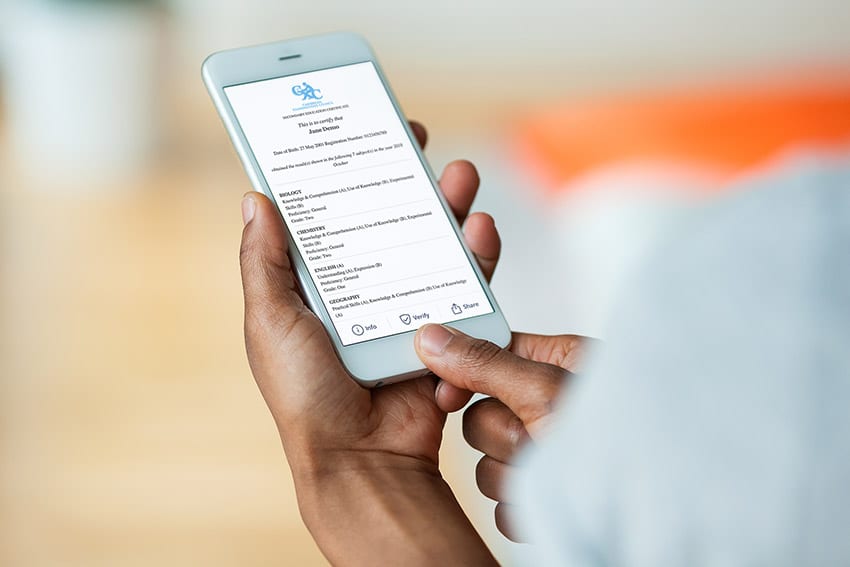
(Photograph courtesy the Caribbean Examinations Council)
After a successful trial period, the Caribbean Examinations Council (CXC) has announced that it will continue to provide students with e-certificates across the region.
While CXC will still be offering the traditional paper-based certificate, students who have registered unique and valid email addresses will now have the option to acquire their official certification through Blockcerts or blockchain based credentials, as a free downloadable e-Certificate in a digital format. It will be immediately available to students on their electronic devices once the certificate is ready and available.
CXC started the first regional blockchain-based credential project last October, by issuing e-Certificates to a select group of 24,000 students from Barbados and Trinidad who sat the 2018 May/June examinations.
CXC Registrar/Chief Executive Officer, Glenroy Cumberbatch said: “Serving 19 countries, this is the first … multi-national implementation of digital credentials designed specifically to maximize cross-border employability and transferability of skills in the region. From inception, our primary goal was to empower students to have ownership of their records and be able to share them in a secure way, with whomever they choose.
“The move was also to boost security and transferability of official examinations records. It also helps to prevent loss of official records. The blockchain, combined with strong cryptography, provides a new security infrastructure that guarantees the authenticity of these records and enables convenient verification.”
CXC e-Certificates will be offered for the Caribbean Advanced Proficiency Exam, Caribbean Secondary Education Certificate and the Caribbean Certificate of Secondary Level Competence.

Registrar of the Caribbean Examination Council), Glenroy Cumberbatch. (Photo: CXC)
Mr. Cumberbatch said e-Certificates add value to students and to the recipients of the e-certificates: “Students can now have their original record in their possession and control how it is used. They can choose to share their CXC e-Certificate publicly, like on social media, or send it privately by email or text message. They can even link it to their résumé, public portfolio, or applications, so that people like potential employers can verify their qualifications with the click of a button.
“E-Certificates are tamper-proof and registered on the Bitcoin blockchain, so they can be shared to colleges, universities, and clearing houses as well. Once received, the recipients of the e-Certificates can independently verify it anywhere. This is all free to students receiving their e-credentials as well as to colleges, universities and potential employers who can now verify certificates immediately. Verification only requires a mobile device or web browser.”
CXC partnered with Learning Machine in June 2018 to collaborate and develop this open source standard for blockchain based records for Caribbean students.
Learning Machine Senior Vice President of Global Services, Kausar N. Samli, said: “CXC is among an elite group of institutions that are leading the charge globally for the issuance of secure, portable, and shareable digital credentials. CXC is now building upon last fall’s successful launch of Blockcerts for issuance of official student records. From this March, the next batch of students will be receiving Blockcerts that will empower them with individual ownership of their official records in a digital format that is portable and easily shareable.”
